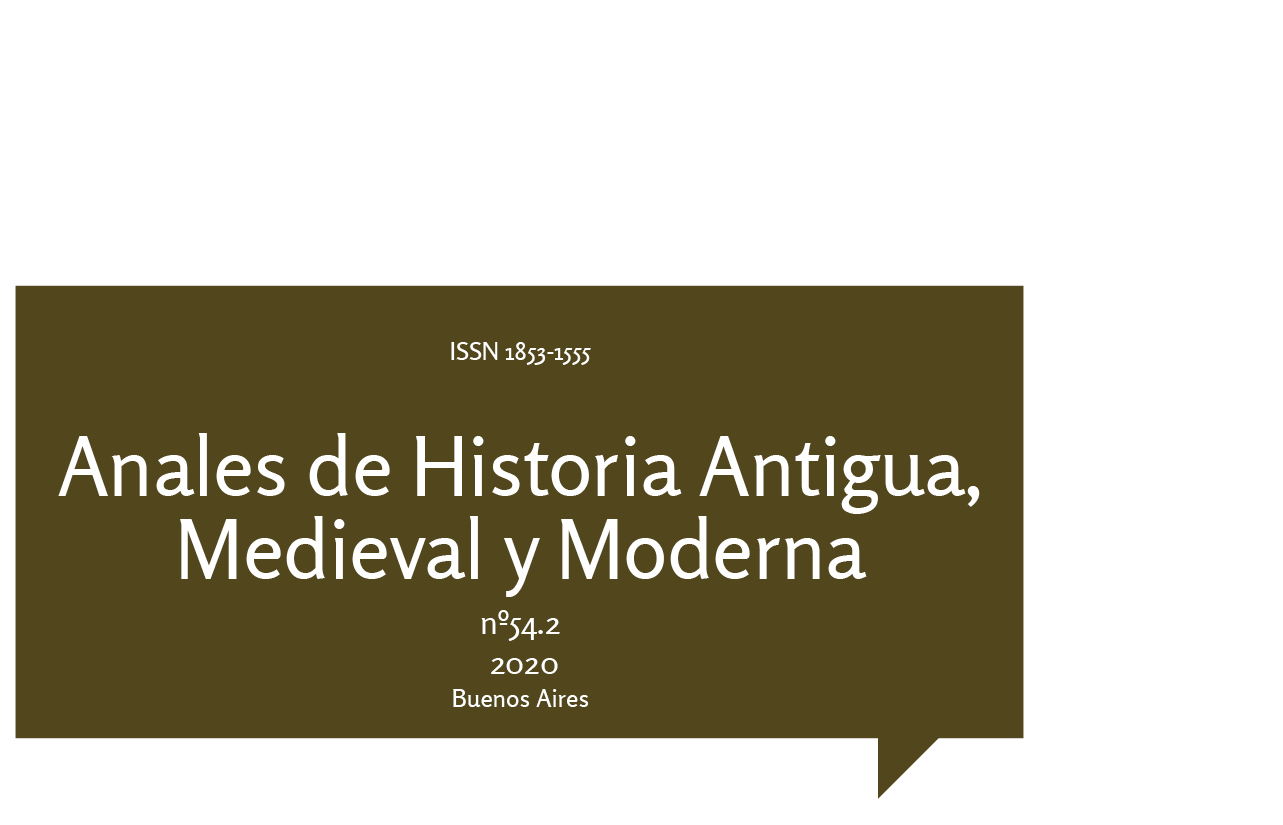As vantagens da História Cruzada para o estudo da História de Esparta no período clássico
Abstract
A relação política das póleis no interior da Hélade sempre foi inevitável diante do mar Mediterrâneo, visto como um espaço relacional de dimensões específicas e limitadas. Diante disso, objetivamos analisar as relações políticas do navarco esparciata Lisandro na Hélade do período clássico por meio do arcabouço teórico da Análise do Discurso francesa e da Teoria de Redes, bem como pelo viés comparativista da História Cruzada. Nesse sentido, propomos que uma investigação munida de indícios de múltiplas temporalidades e espacialidades podem nos fornecer mecanismos para superar a tendência atenocêntrica da historiografia que considerou Lisandro e o basileús Agesilau II como os únicos responsáveis pela desestruturação de Esparta.Downloads
Riferimenti bibliografici
Assumpção, L. F. B. de. (2019). A representação da mḗtis do esparciata Lisandro na Batalha de Egospótamo (405 a.C.). Romanitas. Revista de Estudos Grecolatinos, 13, 127-142.
Beck, H. (2008). Prologue. En J. Buckler y H. Beck (Eds.), Central Greece and the Politics of Power in the Fourth Century B.C. (1-30). Cambridge: Cambridge University Press.
Beck, H. y Funke, P. (2015). An introduction to federalism in Greek antiquity. En H. Beck y P. Funke (Eds.), Federalism in Greek Antiquity (1-29). Cambridge: Cambridge University Press.
Buckler, J. (2003). Aegean Greece in the Fourth Century B.C. Leiden: Brill.
Canfora, L. (2016). Tucidide: la menzogna, la colpa, l’esilio. Bari: Editori Laterza.
Cartledge, P. (1987). Agesilaos and the Crisis of Sparta. Baltimore: The Johns Hopkins University Press.
Cartledge, P. (2003). The Spartans: An Epic History. Londres: Pan Books.
Christien, J. y Ruzé, F. (2007). Sparte: Géographie, mythes et histoire. Paris: Armand Colin.
David, E. (1981). Sparta between Empire and Revolution (404-243 B.C.): Internal Problems and Their Impact on Contemporary Greek Consciousness. Nova Iorque: Arno Press.
De Certeau, M. (2008). A Escrita da História. Rio de Janeiro: Forense-Universitária.
DeVoto, J. (1982). Agesilaos II and the Politics of Sparta, 404-377 B.C. Chicago: Loyola University of Chicago (Tese).
Finley, M. (1981). Economy and Society in Ancient Greece. Nova Iorque: The Viking Press.
Fornis, C. (2016). Esparta: La historia, el cosmos y la leyenda de los antiguos espartanos. Sevilla: Editorial Universidad de Sevilla.
Fornis, C. (2018). El poco espartano patronazgo de Agesilao. En J. Pascual, B. Antela-Bernárdez y D. Castro (Eds.), Cambio y pervivencia. El mundo griego en el siglo IV a.C. (125-139). Madrid: Ediciones Universidad Autónoma de Madrid.
Funke, P. (2009). Between Mantinea and Leuctra. En P. Fnke y N. Luraghi (Eds.), The Politics of Ethnicity and the Crisis of the Peloponnesian League (1-14), Cambridge: Harvard University Press.
Hamilton, C. (1979). Sparta’s Bitter Victories: Politics and Diplomacy in the Corinthian War. Ithaca: Cornell University Press.
Hamilton, C. (1991). Agesilaus and the Failure of Spartan Hegemony. Ithaca: Cornell University Press.
Hanson, V.D. (2012). Uma Guerra sem igual: como atenienses e espartanos lutaram na Guerra do Peloponeso. Rio de Janeiro: Record.
Herman, G. (1987). Ritualised Friendship and the Greek City. Cambridge: Cambridge University Press.
Hodkinson, S. (2000). Property and Wealth in Classical Sparta. Swansea: The Classical Press of Wales.
Kadushin, C. (2012). Understanding Social Networks: theories, concepts, and findings. Oxford: Oxford University Press.
Kagan, D. (1969). The Outbreak of the Peloponnesian War. Ithaca: Cornell University Press.
Kagan, D. (1974). The Archidamian War. Ithaca: Cornell University Press.
Kagan, D. (1981). The Peace of Nicias and The Sicilian Expedition. Ithaca: Cornell University Press.
Kagan, D. (1987). The Fall of the Athenian Empire. Ithaca: Cornell University Press.
Konstan, D. (2005). A amizade no mundo clássico. São Paulo: Odysseus Editora.
Lemercier, C. (2015). Formal Network Methods in History: Why and How?. En G. Fertig (Ed.), Social Networks, Political Institutions, and Rural Societies (281-310). Turnhout: Brepols.
Low, P. (2007). Interstate Relations in Classical Greece: Morality and Power. Cambridge: Cambridge University Press.
Maingueneau, D. (1997). Novas Tendências em Análise do Discurso. Campinas: Editora da UNICAMP.
Malkin, I. (2011). A Small Greek World: Networks in the Ancient Mediterranean. Oxford: Oxford University Press.
Mossé, C. (1968). Les institutions politiques grecques à l’époque Classique. Paris: Armand Colin.
Pires, F. M. (2006). Mithistória (Vol. II). São Paulo: Humanitas.
Powell, A. (2001). Athens and Sparta: Constructing Greek Political and Social History, from 478 BC. Londres: Routledge.
Powell, A. (2010). Divination, Royalty and Insecurity, En A. Powell y S. Hodkinson (Eds.), Sparta: The Body Politic (85-136). Swansea: The Classical Press of Wales.
Raaflaub, K. (2006). Thucydides on Democracy and Oligarchy. En A. Rengakos y A. Tsakmakis (Eds.), Brill’s Companion to Thucydides (189-223). Leiden: Brill.
Rusch, S. M. (2011). Sparta at War: Strategy, Tactics, and Campaigns, 550-362 BC. Londres: Frontline Books.
Starr. C. G. (1965). The Credibility of Early Spartan History. Historia, 14, 257-272.
Ste. Croix, G. E. M. (1972). Spartan Foreign Policy, and the Peloponnesian League. En G. E. M. Ste. Croix (Ed.), The Origins of the Peloponnesian War (89-166). Londres: Duckworth.
Taylor, M. (2010). Thucydides, Pericles, and the Idea of Athens in the Peloponnesian War. Cambridge: Cambridge University Press.
Tritle, L. (1997). Introduction. En L. Tritle (Ed.), The Greek World in the Fourth Century: From the Fall of the Athenian Empire to the Successors of Alexander (1-7). Londres: Routledge.
Vlassopoulos, K. (2009). Beyond and Below the Polis: Networks, Associations, and the Writing of Greek History. En L. Malkin, C. Constantakopolou y K. Panagopoulou (Eds.), Greek and Roman Networks in the Mediterranean (12-23). Londres: Routledge.
Werner, M. y Zimmermann, B. (2003). Pensar a história cruzada: entre empiria e reflexividade. Textos de História, 11(1/2), 89-127.
Westlake, H. D. (1971). Thucydides and the Uneasy Peace. A Study in Political Incompetence. The Classical Quarterly, 21(2), 315-325.
Copyright (c) 2020 Anales de Historia Antigua, Medieval y Moderna

Questo lavoro è fornito con la licenza Creative Commons Attribuzione - Condividi allo stesso modo 4.0.








